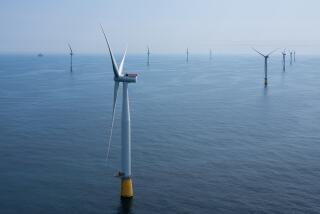Hodel Draws New List of Offshore Oil Tracts : Areas Said to Have More Potential for Meeting Nation’s Needs Than Original Compromise Sites
WASHINGTON — Interior Secretary Donald P. Hodel, preparing for a key meeting with California congressmen today, has drawn up a new list of 150 potential offshore drilling sites that contains only 14 of the tracts included in his original compromise with Congress, department officials said Monday.
The new tracts were tentatively selected for discussion, the officials said, because they would best meet the nation’s energy needs without intruding into environmentally sensitive areas or coastline used by the military.
Hodel’s aides refused to specify the location of the tracts on the new list, saying nothing yet is final. Officials noted, however, that they believe that there is good energy potential off the shore of Santa Cruz, Point Arena and Bodega Bay, areas not proposed for leasing under the original compromise.
Mostly Northern California
The original agreement, announced July 16 after weeks of negotiation, would have opened 150 nine-square-mile tracts of ocean floor for oil exploration, mostly off Northern California, and would have protected 6,310 tracts from drilling for 15 years. The oil industry strongly objected to the proposal.
David Prosperi, an Interior Department spokesman, said Hodel did not have an economic and geological analysis of the tracts when he reached the preliminary agreement with legislators. Since then, Prosperi said, Hodel has learned that the agreement is “not in the national interest because of low resource potential.”
He added, “The potential for those tracts under the preliminary agreement is only 5% to 10% of the total resource potential off the shore of California.”
Prosperi also noted that Hodel negotiated the preliminary agreement under a deadline, trying to forestall a congressional subcommittee vote on a proposed moratorium. At the time Hodel accepted the agreement, he said, the committee vote was a few days away and congressional negotiators had indicated that they would not move any further.
Hodel is scheduled to meet with California’s congressional delegation today to ask for continued negotiations. Rep. Leon E. Panetta (D-Carmel Valley), who was instrumental in negotiating the preliminary agreement, said, however, that Hodel has lost his credibility with members by backing away from the July compromise.
“He’s going to have to establish some good faith to have any hope of negotiating,” Panetta said. “At this point, I don’t know what he could do to reestablish his own credibility.”
Pressure Tactics Feared
Panetta said Hodel is using prior lack of information about the viability of the tracts as an excuse for crumbling under pressure from the oil industry.
“We’re not dealing with a babe in the woods,” Panetta said. “He was the secretary of energy and the deputy secretary of Interior” before taking over the top Interior post.
Meanwhile, supporters of the preliminary agreement may try to get it through Congress without Hodel’s backing or, as an alternative, may seek a moratorium on any leasing, Panetta said.
“The pros of moving the agreement (through Congress) is that Hodel negotiated it with the delegation,” Panetta said. “To simply move a moratorium, on the other hand, just gets us back to ground zero.”
Areas Near Islands
The eight environmentally sensitive areas excluded by Hodel from exploration are Santa Barbara Ecological Preserve, the Channel Islands National Marine Sanctuary, the Cordell Bank and areas off Big Sur, the Farallon Islands, Point Reyes and San Francisco and Monterey bays.
Hodel met with environmental leaders Monday to discuss his reactions to a series of public meetings held in California last month to solicit comment about the preliminary agreement.
“Essentially, what he told us was this is not an agreement any longer, that the wrong 150 tracts had been identified, that rather than this being the agreement, it was really one step in the process whereby a final agreement would be established with the right tracts and the right time frame,” said Karl Wendelowski, executive director of Friends of the Earth, who attended the meeting.
Phillip Clark, vice president of the National Ocean Industries Assn., said both Hodel and his staff indicated in recent meetings that the agreement would be negotiated further.
“There were some real mistakes made in the assessment process,” said Clark, whose group represents 450 companies involved in offshore development. “Hodel thought there was a good deal more oil and/or gas in those (original 150) tracts than subsequently turned out to be the case. We accept that on face value. It was an honest mistake.”
More to Read
Get the L.A. Times Politics newsletter
Deeply reported insights into legislation, politics and policy from Sacramento, Washington and beyond. In your inbox three times per week.
You may occasionally receive promotional content from the Los Angeles Times.










